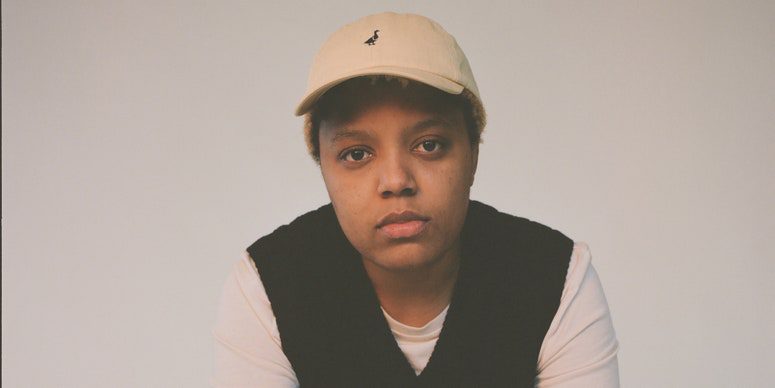The Kübler-Ross model has done the bereaved dirty ever since it entered the public consciousness in the 1970s. Its five tidy stages are woefully inadequate to handle the myriad shifting forms of grief: unpredictable physical manifestations, the random recovery or loss of memories, slow-dawning realizations, circular ruminations. Time doesn’t heal all wounds, but it can help form emotional scar tissue. Loraine James’ third album for Hyperdub, Gentle Confrontation, is a self-examination of the marks and bruises inflicted by a significant loss in childhood. James has always wielded her voice as a malleable tool—sometimes sharpened into a jagged point between glitchy stop-start arrangements and skittering drums, other times barely perceptible beneath woozy pitch bends and plaintive synth chords. But with Gentle Confrontation she sounds newly and vocally vulnerable. “When I was seven my dad went to heaven, possibly,” she croons on “2003,” the album’s lead single. “I looked at the sky: uncertainty/It hurt me, uncertainty.”
In the six years that she’s been releasing music, James has proven herself to be a gifted moodsmith with no shortage of textures to meditate within. Alongside two previous albums of dancefloor-skewed IDM, there was a tender tribute album to minimalist composer Julian Eastman, Building Something Beautiful for Me, and a self-titled LP from her ambient project Whatever the Weather, all released at an impressive pace. In retrospect, it now seems that the Eastman project and Whatever the Weather may have been necessary precursors for James to tap into the marrow of such heartfelt material on Gentle Confrontation. The album’s self-titled opening track elegantly bridges the full expanse of James’ identities in an introduction that feels suitably cinematic: A dramatically swelling orchestral arrangement is given generous space to establish a doleful emotional register before being joined by electronic pulses and sampled drum loops.
Gentle Confrontation sprawls, and each track settles into a distinct tonality. James mirrors her raw lyrics on “2003” with a spare musical arrangement that consists of little more than the rhythmic movement of air through gasping levers and bellows. The coolly modern R&B production of “Let U Go” is remarkable for its subtly twisted feeling of discombobulation: Samples run in reverse beneath wonky chords; vocal processing renders indie R&B darling KeiyaA’s voice unrecognizable. Other standouts include “I DM U,” which pits James’ heady, unpredictable programming against the sharp sticks of Black Midi drummer Morgan Simpson. “Cards With the Grandparents” turns inwards, transforming a vignette of family life into an abstract sound study: James samples the sounds of a shuffling deck, laughter, and conversation, but she balances the light-hearted patter with a dose of melancholy (“My grandad has dementia, but he’s still very cool”).
When James revisits an idea, which she does a couple of times, each second pass reveals her evolutionary process. “Glitch the System (Glitch Bitch 2)” takes up where “Glitch Bitch,” from her 2019 album For You and I, left off. While the rework keeps the earlier track’s mid-tempo kick and swing, it casts off the fixed 4/4 structure and dials up the fluttering synth pads and pillowy kicks, yielding a melodic push-and-pull that soars with abandon. Similarly, “Prelude of Tired of Me” offers a mumbling inner monologue and a bottom-heavy sketch of a beat, whereas “Tired of Me,” seven tracks later, arrives spruced up and with extra sass. What at first seems like reticence—Loraine is back, she mutters, but she’s not feeling it, doesn’t want to talk about it, doesn’t want to think about it—abruptly dissolves into soft golden light and the plucked tones of a pastoral sunbeam. “I left it all/And I wonder/How would I find the power again?” she harmonizes, delicately.
Gentle Confrontation is peppered with notable collaborations, perhaps in acknowledgement of the role that music plays in formative years, when metabolizing one’s own thoughts and emotions through the lyrics and gestures of others becomes so critical. James credits early-2000s indie-electronic acts Lusine and Dntel as inspirations, and you can hear their influence on “One Way Ticket to the Midwest (Emo)” which features Corey Mastrangelo of the math-rock band Vasudeva. Its lilting folktronica is sweetly calming, providing a moment of rest at the album’s midpoint. But across the sheer length and expansiveness of Gentle Confrontation, some collaborations—particularly the sleek, sophisticated ballads featuring Eden Samara and George Riley—don’t quite attain the same level of resonance. Though delicately sung and tastefully produced, both lack the sense of revealing transformation so convincingly conveyed at other points in the album.
In the album’s closing track, “Saying Goodbye,” Contour sings a telling line: “To look me in the eye is to know my strife.” His velvety timbre and gentle cadence smooth over James’ fractured synths and scratchy percussion. Along with the opening title track, it provides a poignant bookend to an album that refuses to draw a neatly conclusive arc. Instead, Gentle Confrontation offers an invitation to bear witness to a process that’s human, hard to define, and close to the heart.
All products featured on Pitchfork are independently selected by our editors. However, when you buy something through our retail links, we may earn an affiliate commission.


